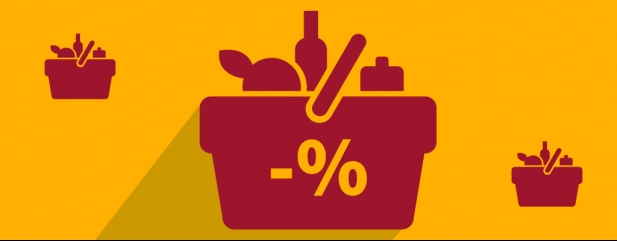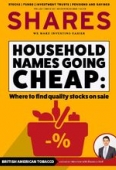Archived article
Please note that tax, investment, pension and ISA rules can change and the information and any views contained in this article may now be inaccurate.
Household names going cheap: where to find quality stocks on sale

With the FTSE touching post-pandemic highs and US markets pushing towards record levels, it’s reasonable to ask if there is any value left in stocks.
The problem for investors looking for income and capital gains is, with rock-bottom returns on bonds and constant central bank support, there are few alternatives to stocks and shares.
However, despite the recent surge in one or two cyclical sectors like energy and banks we don’t think it makes sense to switch wholesale into ‘value’ stocks.
Instead, we have found half a dozen big shares, all household names with resilient business models, where in our view growth over the next 12 months isn’t being priced in properly and which now offer great relative value, both against their past valuations and the broader market.

FALLING BY THE WAYSIDE
As we recently observed, after a choppy September with the FTSE selling off sharply into mid-month before rebounding, a lot of what we consider sensible companies have seen their shares fall by the wayside.
Rather than try to catch a short-term bounce in the most downtrodden names though, we’re interested in stocks which were already being sold off before September and where prices now look completely out of line with their prospects. The table overleaf shows names from London’s Main Market which have sold off recently, but where this doesn’t represent profit taking after an exceptionally strong run.
Not all of these companies represent attractive investments but the Shares team has looked through them to identify those where recent share price weakness looks unwarranted – these are highlighted in green in the table.
We’ve also extended our search a little further to the largest AIM companies and found a diamond in the rough there too.
CONSUMER STOCKS UNDER PRESSURE
One of the areas of the market which has seen the biggest de-rating is the consumer discretionary sector, including companies which did well during the pandemic but which the market has since decided will struggle to keep up that growth momentum.
While the way we spend our money has changed a lot in the last year and a half – more of us are using the internet to shop and we’re using credit and debit cards instead of cash, for instance – we’re generally still buying the same things we were before the pandemic.
Therefore, it seems odd that the market has de-rated these well-known, high-quality consumer-facing companies – three of which are in the FTSE 100 no less – with visibly improving earnings, especially when the broader market is being re-rated.
HOUSEHOLD NAMES ON SALE
AB Foods (ABF)
Price: £17.60 – Market Cap: 14 billion
Index: FTSE 100
Unlike the some of the other names discussed here, AB Foods – and specifically its biggest profit centre, Primark – was a lockdown loser, only coming into its own when vaccinations began to be rolled out late last year.

Despite a strong rally into the early summer, the shares swiftly turned down and have lost virtually all their gains of the last 12 months. Moreover, they are just half their peak of late 2017 when it seemed the company could do no wrong.
Regardless of its lack of an online capability, Primark remains a ‘category killer’ in the fast fashion market with prices and an appeal to its core customer base few can match.
In its pre-close trading update last month, the firm said despite lower than expected sales at Primark operating profits would be ahead of expectations and ahead of last year.
At the same time, the sugar business is seen delivering a bigger increase in operating profits than expected thanks to a very strong performance in its African business Illovo.
The firm also owns market-leading food brands, among them Twinings, Jordans, Dorset Cereals and Ryvita which generate dependable if unspectacular cash flows.

While it is common for conglomerates to trade at a discount to the sum of their parts, investors are being asked to pay just 13 times next year’s ‘recovery earnings’ and 12 times normalised earnings the year after which seems uncommonly cheap. (JC)
ASOS (ASC:AIM)
Price: £25.40 – Market cap: £2.5 billion
Index: AIM 50
If we ignore the pandemic low then ASOS shares are trading at levels they haven’t seen since 2019, despite the fact the firm generated £344 million of EBITDA in the year to August or more than three times 2019’s figure.

There’s no doubt ASOS was another pandemic winner, with customers flocking to buy comfy leisurewear during lockdown, and sales growth will moderate from 20% last year, but it is still expected to be between 10% and 15% this year and next year.
Short-term headwinds such as supply chain pressures, delivery and labour costs will dissipate, while investment in technology is reducing overheads and improving the customer experience with the use of artificial intelligence and data mining.
At the same time, new categories are being added, like Face + Body where sales were up nearly 50% last year to £150 million, and the firm is targeting £7 billion of annual sales from less than £4 billion last year in an addressable market which it estimates to be worth £430 billion.

Based on consensus forecasts, the shares are now trading on 22 times this year’s earnings and 17 times next year, compared with 55 times earnings a few years ago. That seems cheap for a business with a potential market 100 times bigger than its current sales. (IC)
Homeserve (HSV)
Price: 832p – Market cap: £2.8 billion
Index: FTSE 250
Homeserve sells homeowners insurance against unexpected plumbing, heating or electrical emergencies, and provides qualified tradespeople to sort things out if there’s a problem.

It operates in the UK and the US, where it already has almost five million ‘members’. It also runs the Checkatrade platform, charging tradespeople to advertise, so it has two steady income streams.
The issue is the firm needs to spend to grow, and a big splurge on HVAC (heating, ventilation and air-conditioning) suppliers and installers in the last year has seen its debt pile up.
It also took an £85 million provision to write off its customer relationship management platform, which was no longer fit for purpose, hammering earnings.
Given that both these issues are temporary, and the firm is by nature highly cash-generative with regular income from insurance and advertising, we don’t see there being any lasting damage, but the company’s general lack of communication doesn’t really help.
The last update in July talked about strong growth in the US and a return to profitability at Home Experts this year, but since then it’s been radio silence and the half-year results aren’t until mid-November.

Given expectations are low, good news could see the market reappraise Homeserve’s growth potential leading to a proper re-rating of the shares, which are trading on just over 20 times this year’s earnings against more than 30 times in previous years. (IC)
Reckitt Benckiser (RKT)
Price: £54.58 – Market cap: £39 billion
Index: FTSE 100
Like Unilever, shares in Reckitt have recently been trading at their lowest price since the pandemic. What’s more, excluding the March 2020 low, the shares haven’t been this price since early 2018.

There is no question Reckitt was another pandemic winner, as global sales of hygiene and health products like Dettol and Lysol soared last year, and as with other winners, investors are questioning whether growth is sustainable.
What they have missed is that sales of these two key products have continued to grow this year. The weakness has been the Chinese infant formula business, which thankfully the firm has now sold, and in over-the-counter cold and flu treatments after cases dropped 90% following repeated global lockdowns and the roll-out of vaccinations.
Third quarter results were well ahead of expectations, with like for like sales up 3.3% against estimates of -0.7% and 15% growth last year. The increase was evenly split between higher volumes and higher prices, with sales up in all areas including cold and flu products.
On a two-year basis group sales were up 18% which tells us this is a structural uplift in demand not just a pandemic boost.

Thanks to this strong performance the firm raised its 2021 and 2022 growth guidance and kept its margin target. We think less than 20 times forward earnings is a bargain for a world-class business like Reckitt. (IC)
Wetherspoon (JD)
Price: 950p – Market cap: £1.2 billion
Index: FTSE 250
Rather like Primark, ‘Spoons’ as it is affectionately known has a large and highly loyal fan base, but unlike Primark its customers span the entire age range from students to the retired who all appreciate its value-for-money proposition.

Like every hospitality business it suffered disproportionately during the pandemic, and although the shares had a good run post-reopening they have now handed back the bulk of their gains.
Yet, thanks to a capital raise at the beginning of the year the firm has the firepower to expand its estate and garner further market share while others are still in self-preservation mode.
Meanwhile, trading has been better than expected with like for like revenues down just 6.4% in September against expectations of a 15% drop, and the company expects turnover to return to 2019 levels next year.
Consensus earnings expectations have been steadily revised up since mid-year and the shares are trading on just over 20 times current year forecasts and less than 17 times the year after.

Earlier this month analysts at Peel Hunt and Stifel raised their recommendations to buy and Panmure Gordon initiated coverage, also with a buy, indicating the broking community thinks the sell-off is overdone. (MGam)
Unilever (ULVR)
Share price: £38.22 – Market Cap: £98.5 billion
Index: FTSE 100
Shares in Unilever were recently trading at the same level they were 18 months ago during the pandemic even though, as its third quarter results demonstrated, the company is continuing to grow sales and earnings.

Investors who may have been wary about the firm’s ability to push through price increases to offset slowing volume sales and rising input costs have realized the group’s brands have enough appeal with consumers for it to be able to pull it off.
Moreover, it’s not alone. Swiss rival Nestle increased prices last quarter to deliver forecast-beating sales and other leading FMCG firms such as Danone and Procter & Gamble have warned consumers can expect higher bills at the check-out in coming quarters.
Estimates for the full year imply fourth-quarter sales growth of just 3.3% against 4.6% last quarter, which looks easily achievable, while sales are expected to increase just over 4% next year and underlying operating margins are seen flat at 18.4%.

At the current share price, that means investors are paying just over 18 times next year’s earnings and just over 17 times 2023 earnings compared with historic multiples in the mid to high 20s. On a relative value basis, we think that kind of discount is too good to pass up for a quality stock. (IC)
Important information:
These articles are provided by Shares magazine which is published by AJ Bell Media, a part of AJ Bell. Shares is not written by AJ Bell.
Shares is provided for your general information and use and is not a personal recommendation to invest. It is not intended to be relied upon by you in making or not making any investment decisions. The investments referred to in these articles will not be suitable for all investors. If in doubt please seek appropriate independent financial advice.
Investors acting on the information in these articles do so at their own risk and AJ Bell Media and its staff do not accept liability for losses suffered by investors as a result of their investment decisions.

 magazine
magazine








